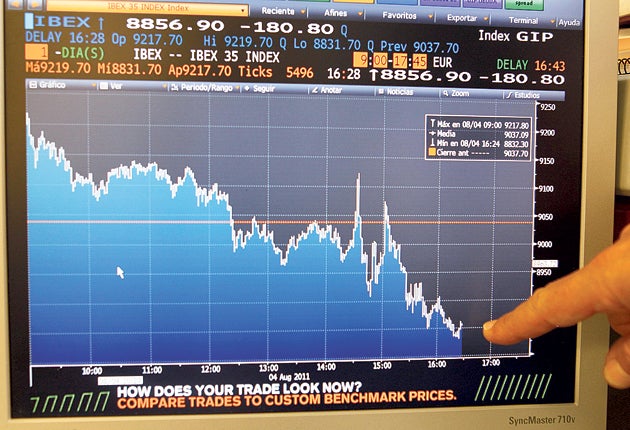Billions wiped off stock markets as world takes fright over debt crisis

Your support helps us to tell the story
From reproductive rights to climate change to Big Tech, The Independent is on the ground when the story is developing. Whether it's investigating the financials of Elon Musk's pro-Trump PAC or producing our latest documentary, 'The A Word', which shines a light on the American women fighting for reproductive rights, we know how important it is to parse out the facts from the messaging.
At such a critical moment in US history, we need reporters on the ground. Your donation allows us to keep sending journalists to speak to both sides of the story.
The Independent is trusted by Americans across the entire political spectrum. And unlike many other quality news outlets, we choose not to lock Americans out of our reporting and analysis with paywalls. We believe quality journalism should be available to everyone, paid for by those who can afford it.
Your support makes all the difference.Stock markets suffered their worst fall in more than two years yesterday as worries about Europe's sovereign debt woes came together with mounting concern about the health of the global economy.
In London, investors lost £49.8bn as the FTSE 100 index of leading shares fell by more than 3.4 per cent, its worst showing since March 2009. On the Continent, the German stock market fell by more than 3 per cent, while Spain and France saw shares drop by nearly 4 per cent. The Milan stock market fell more than 5 per cent before being suspended at the close.
Banks bore the brunt of the sell-off amid worries about impact of the European debt issues on the financial sector. Lloyds Banking Group, the part -nationalised lender that posted more than £3bn in loss yesterday, saw its shares fall by an eye-watering 10.1 per cent, while in Italy, Unicredit, one of the country's biggest banks, was down by more than 9 per cent before the main index was suspended.
The picture was no better on the other side of the Atlantic, with Wall Street's Dow Jones index closing down 4.3 per cent and more than 500 points.
Meanwhile, the future of the eurozone looked bleaker than ever, with European Commission President Jose Manuel Barroso admitting that the debt crisis was now threatening Spain and Italy – the two Contin- ental giants that took centre stage in the European debt crisis this week. Echoing financial analysts, Mr Barroso said it was clear that eurozone leaders had failed to stem the problem, despite hailing a deal just two weeks ago that led to a Greek rescue package and, they claimed, saved vulnerable members from financial meltdown.
In a letter to all 27 members of the EU, Mr Barroso called for their "full backing" to protect the euro and called for the continent's bailout fund to be reassessed. Although he did not explicitly refer to the size of European Financial Stability Facility, experts argued that at €440bn it too small to meeting the potential funding requirements of Italy or Spain, which analysts have suggested are, unlike Greece, to big to save.
"Markets remain to be convinced that we are taking the appropriate steps to resolve the crisis," Mr Barroso said. "It is clear that we are no longer managing a crisis just in the euro area periphery." He added: "Euro area financial stability must be safeguarded, with all EU institutions playing their part with the full backing of euro area member states."
Join our commenting forum
Join thought-provoking conversations, follow other Independent readers and see their replies
Comments